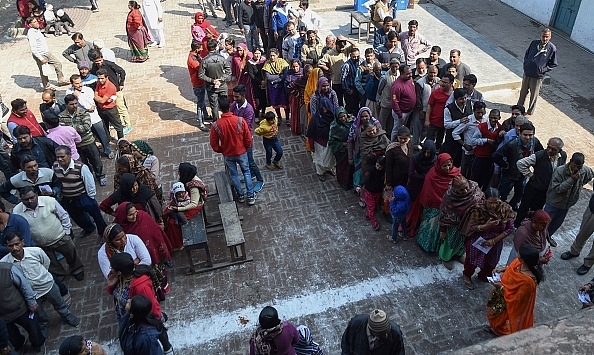
Phase 3 Of #UP2017: Real Test Of BJP’s OBC Outreach
Unlike the first two phases when Muslims and Jats called the shots, this phase would see mainly the OBCs decide the fate of 826 candidates.
Brahmins, who are holding their cards close to their chest, will also influence the poll outcome in districts like Unnao, Kannauj and Kanpur.
The Other Backward Classes (OBC) factor comes into play as the countdown begins for the third phase of elections in Uttar Pradesh.
Mulayam Singh Yadav’s chhotee bahu Aparna Yadav, Samajwadi Party (SP) MP Naresh Agarwal’s son Nitin Agarwal and Congress leader P L Punia’s son Tanuj are among the 826 candidates who are in the field in this round. Senior Bharatiya Janata Party (BJP) leader’s son Ashutosh Tandon is also seeking re-election.
Lucknow and Etawah, along with 10 other districts comprising 69 assembly seats, go to poll on 19 February.
The OBC dominated belt also includes Kannauj, the Lok Sabha constituency of Chief Minister’s wife Dimple Yadav, Farrukhabad, Mainpuri, Etawah, Auriaya - all Samajwadi Party strongholds. Kanpur Dehat, Kanpur, Unnao, Barabanki and Sitapur are the other districts going to poll in this phase.
This phase will test BJP’s strategy of fielding over 100 candidates belonging to the OBCs. In 2012, the SP had made a near clean sweep by winning 55 of the 69 seats going to polls. The Bahujan Samaj Party (BSP) with six and BJP with five seats were a distant number two and three. The Congress could win only two seats and remain a bystander, while the remaining seat went to an Independent.
On February 16 evening, chief minister Akhilesh Yadav went about seeking votes for his sister-in-law Aparna Yadav, coinciding his visit with the full trial run of the Lucknow Metro from Alambagh to Charbagh, giving him an opportunity to compare his development model with Prime Minister Narendra Modi’s “achhe din”.
Mulayam, who has campaigned only for his brother Shivpal and daughter-in-law Aparna, was virtually avoided by other SP candidates in electioneering as they swore by Akhilesh’s magic.
Akhilesh though has avoided visiting Jaswantnagar, his uncle Shivpal Singh Yadav’s constituency in Etawah.
Campaigning for this phase witnessed exchanges between Modi and Akhilesh with the Prime Minister’s “kaarnama bolta hai (misdeed speaks) jibe against UP Chief Minister’s “kaam bolta hai” (work speaks)” claim, while Rahul Gandhi attacked the Prime Minister for ‘peeping into others’ bathroom’.
Akhilesh, who was accompanied by Congress’s Ghulam Nabi Azad, asked voters to give “ek-ek vote to Aparna” to help her win the “VIP constituency of VIP shehar Lucknow”.
Aparna is facing former UPCC president Rita Bahuguna Joshi, the sitting MLA, for the Lucknow Cantonment seat.
The Lucknow Cantt seat was with the BJP from 1991 to 2007. In 2012 Joshi grabbed the seat when she defeated Suresh Tiwari, the three-time BJP MLA who has been left sulking by the party.
The BJP faces the task of winning Joshi’s seat besides other seats of Lucknow, the parliamentary constituency of Union Home Minister Rajnath Singh.
When it comes to the BSP, the party finds itself fending off attack from both the SP and the BJP. Left weakened by the defection of her tallest OBC leader, Swami Prasad Maurya, Mayawati could find the going even harder in this round.
Unlike the first two phases when Muslims and Jats called the shots, this phase would see mainly the OBCs decide the fate of 826 candidates. Brahmins, who are holding their cards close to their chest, will also influence the poll outcome in districts like Unnao, Kannauj and Kanpur.
Indirectly helping the BJP’s cause will be the SP leaders who turned rebels after being denied tickets. In Barabanki, for example, Beni Prasad Verma’s Kurmi votes may go in BJP’s favour instead of the SP as Beni’s son Rakesh Verma was denied ticket by Akhilesh.
In Lucknow Central, Congress’s Maroof had turned rebellious after being denied ticket.
With 1,10,27,390 women voters it is hardly surprising that there are 105 female contestants in this phase. Aware of the sizeable presence of women voters in his Lucknow East seat, SP’s Anurag Bhadauriya is assiduously trying to reach out to them citing Akhilesh Yadav’s clean and pro-development image.
Overall, there are 2,41,67,407 voters in this phase.